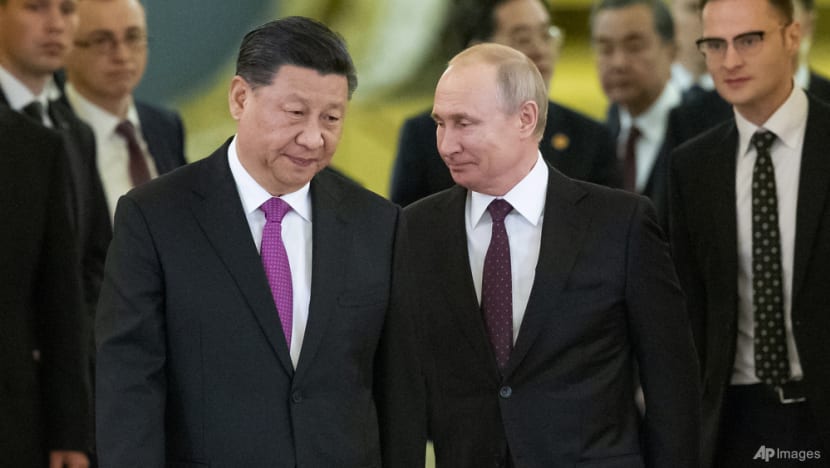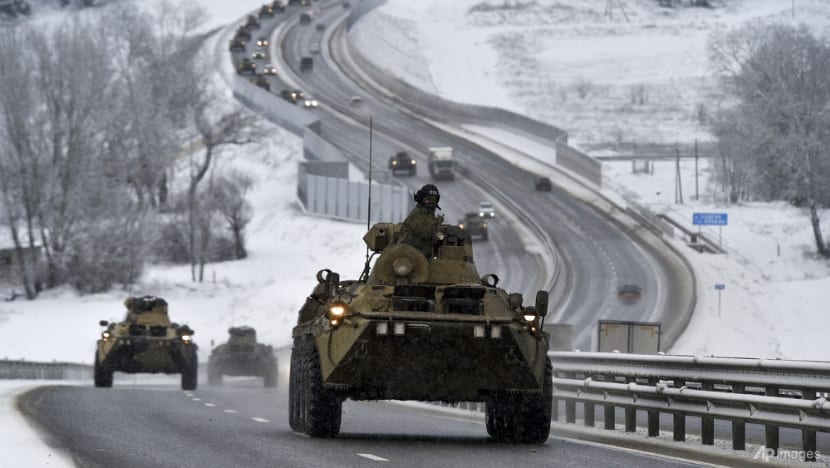Commentary: Warming Russia-China relations shift balance at time of US vulnerability
The US embraced China to counter the Soviet military threat during the Cold War, but a comparable strategy has now brought China and Russia together, says an American economist.

NEW HAVEN, Connecticut: History’s turning points are rarely evident with great clarity.
But the Feb 4 joint statement of Russian President Vladimir Putin and Chinese President Xi Jinping as the Winter Olympics opened in Beijing may be an exception – signaling a new turning point in a new Cold War.
Triangulation was America’s decisive strategic gambit in the first Cold War. Richard Nixon’s rapprochement with China, 50 years ago this month, isolated the former Soviet Union at a time when its economic foundation was starting to crumble.
As Henry Kissinger put it in his opus, On China: “The Sino-US rapprochement started as a tactical aspect of the Cold War; it evolved to where it became central to the evolution of the new global order.”
It took time for the strategy to succeed. But, 17 years later, the Berlin Wall came down and the Soviet Union imploded.
Never one to ignore the lessons of history, China is opting for its own triangulation gambit in a nascent second Cold War. A China-Russia tandem could shift the global balance of power at a time when America is especially vulnerable. This points to a worrisome endgame.
Important hints can be found in the triangulation of the first Cold War. Fearful of the Soviet military threat, the United States countered by embracing China in an economic marriage of convenience.
Never mind that the US-China partnership, which initially provided cheap products for hard-pressed American consumers, has now been shattered by a trade and tech war. The point is that a comparable strategy has now brought China and Russia together.
MARRIAGE OF CONVENIENCE FOR XI JINPING AND VLADIMIR PUTIN
This new marriage is convenient in both economic and geostrategic terms. Russia has the natural gas that an energy-hungry, coal-dependent, polluted China needs. And China, with its surplus savings, ample foreign capital, and its Belt and Road Initiative, offers Russia added clout to buttress its thinly-veiled territorial ambitions.
The geostrategic angle is equally compelling. Rightly or wrongly, both Xi and Putin are convinced that the United States seeks to contain their supposedly peaceful rise.
China points not just to former US president Donald Trump’s tariffs and to sanctions on its leading technology companies, but also to an ambitious Trans-Pacific Partnership that excluded China (and which has since morphed into the Comprehensive and Progressive Agreement for Trans-Pacific Partnership).
More recently, Australia, the United Kingdom, and the US established the AUKUS trilateral security agreement, which takes dead aim on China.
Putin makes a similar case in resisting US containment of Russia. Fearful of North Atlantic Treaty Organization (NATO) enlargement, he appears more than willing to hold Ukraine hostage and take Europe to the brink of yet another devastating conflict.
Putin, who has described the demise of the Soviet Union as “a major geopolitical disaster of the [20th] century,” would like nothing better than to rewind history. Yet US President Joe Biden’s threats may well have cornered Putin, leaving him with no face-saving path for de-escalation.
The joint Sino-Russian statement of Feb 4 leaves little doubt that both leaders are united in the view that America poses an existential threat to their ambitions.
Putin was successful in getting Xi to weigh in against NATO expansion – an issue well outside the Chinese leader’s wheelhouse. And Xi co-opted Putin to sign on to an agreement that fits the template of “Xi Jinping Thought,” promoting their joint statement as yet another of China’s grandiose “new era” policy pronouncements.
There can be little doubt that China and Russia have embraced triangulation as a strategic gambit.

A WEAKER US ECONOMY FACING A RISING CHINA
Ironically, unlike the first Cold War, the US is the one now being triangulated. And, as before, there is good reason to believe that the endgame will be determined in the economic arena.
That’s where the comparison between the two cold wars is especially worrisome. From 1947 to 1991, the US economy was balanced and strong.
By contrast, over the past decade, real gross domestic product growth (1.7 per cent) and productivity gains (1.1 per cent) were half their average rate over that earlier 44-year period. Recent comparisons are even worse for domestic saving, the current account, and America’s gaping trade deficit.
The US prevailed in the first Cold War not just because its economy was strong but also because its adversary’s was hollow.
Starting in 1977, per capita output growth in the Soviet Union slowed dramatically, before plunging at a 4.3 per cent average annual rate in the final two years of the Cold War. That presaged a subsequent economic collapse in the Soviet Union’s successor. From 1991 to 1999, the Russian Federation’s economy shrank by 36 per cent.
Today, a weaker US economy is facing a rising China, in contrast to the earlier clash between a strong America and a faltering Soviet Union. Nor is China’s clout likely to be diminished by Russia, a bit player in the global economy.
In 2021, Chinese GDP was six times that of Russia, and the gap is expected to widen further in the coming years.
PARTNERS TO DESTABILISE AND DEFLECT
Yet Putin gives Xi precisely what he wants: A partner who can destabilise the Western alliance and deflect America’s strategic focus away from its China containment strategy.
From Xi’s perspective, that leaves the door wide open for China’s ascendancy to great-power status, realizing the promise of national rejuvenation set forth in Xi’s cherished “China Dream.”
In late 2019, Kissinger warned that the US and China were already in the “foothills of a new cold war.” The plot has since thickened with the emergence of a new triangulation strategy. The Xi-Putin gambit reinforces the conclusion that this cold war will be very different from the last one.
Sadly, America appears to be asleep at the switch.
Stephen S Roach, a faculty member at Yale University and former chairman of Morgan Stanley Asia, is the author of Unbalanced: The Codependency of America and China (Yale University Press, 2014) and the forthcoming Accidental Conflict. PROJECT SYNDICATE



















